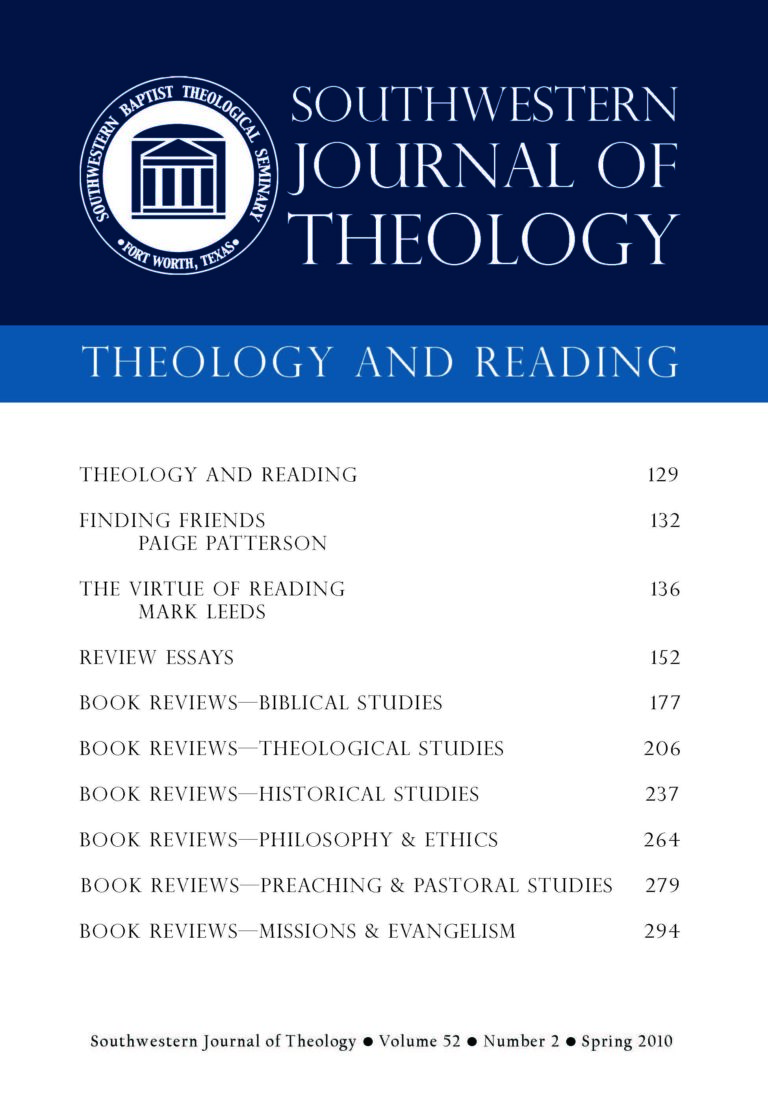
Theology and Reading
Southwestern Journal of Theology
Volume 52, No. 2 – Spring 2010
Managing Editor: Malcolm B. Yarnell III
by Ronald J. Sider. Grand Rapids: Baker Books, 2008. Paperback $15.99.
The publication of Sider’s book was extremely timely as the United States faced presidential elections during 2008. Thirteen chapters summarize what the author calls the “scandal” of evangelical politics. In reality, however, only in the introduction does Sider describe what he believes is the tragic failure of evangelicals. What is this failure? According to the author, evangelicals have been naïve and superficial in their analysis of and participation in crucial political issues. This is, however, only the tip of the iceberg because the major problem underneath this lack of responsible political participation is their failure to produce a solid political theology.
The book intends to fill in this huge gap, thus offering a hope “to change the world”(23). In presenting his own proposal of political theology, the author advances the need for a faithful methodology that is acquainted with the history of Christian political thought, and the pluralistic society of the 21st century. He believes that in order to make responsible political decisions, evangelicals should also develop a methodology that includes (1) a normative framework, (2) a broad study of society and the world, and (3) a political philosophy, as well as (4) a detailed social analysis on specific issues.
In order to construct a normative framework for his political theology, Sider affirms that two things are needed: 1) a biblical story of the world and humans that is respectful of the whole canon and of Jesus as its center (41), and 2) comprehensive summaries of biblical teachings concerning political topics (state, justice, human rights, etc.).
About twenty-five pages are devoted to explain the biblical story (49–75). From there, nine chapters are devoted to elucidate the nature of the state, justice, human rights, the sanctity of human life, marriage and family, religious freedom, nonviolence, creation care, and nation-state international affairs.
This is an excellent introductory book to the vast area of theological politics. Sider has done an extremely good job in enlisting some of the major issues we should care about as theological and political beings. Evangelicals should follow the author’s invitation to analyze his proposals and perspectives. In doing so, we may discover that some of our most cherished political convictions stand on shaky ground. We may also discover ourselves disagreeing with the author in particular areas and lacking more information and study in others.
At points, the author may give the impression that the biblical and theological task is relatively easy to disentangle. Doubtless that is the case with some fundamentals (canonical comprehensiveness, Jesus’ priority, etc.); however, the theological and hermeneutical task, as contemporary theology testifies, is profusely complicated. Much more than a short discussion on paradigms is needed in order to construct a solid framework for an evangelical political theology.
In other instances, Sider’s analysis seems to lack comprehensiveness in the handling of the biblical data. A clear example of this is his study on capital punishment. Jesus’ teaching on the subject should not be confined only to a superficial analysis of John 8:3–11 and a paragraph affirming Jesus’ overruling of some Old Testament regulations. This topic is critical and sensible enough to deserve a meticulous treatment.
Finally, the same can be said of other chapters such as that on international affairs, especially in what is related to immigration. The question: “Does a rich nation have the moral right to refuse entry to poor immigrants from needy nations seeking economic opportunity?” (225) is crucial and relevant. Sadly, he devotes only three paragraphs to answer it. Even finding myself in general agreement with his answer, I must say that more exact biblical data and precise sociological analysis is demanded.
The Scandal of Evangelical Politics should be read by all evangelicals. Politics does not stop and neither should the evangelical’s appraisal and evaluation of it. Unless we want keep on participating in the scandal of ignorance, inconsistency or indifference, we should help develop a more responsible evangelical political theology. We owe it to our identity and mission in the world, but first of all we owe it to our Lord and Savior. Ronald J. Sider is to be commended for providing a valuable resource to accomplish the task.





